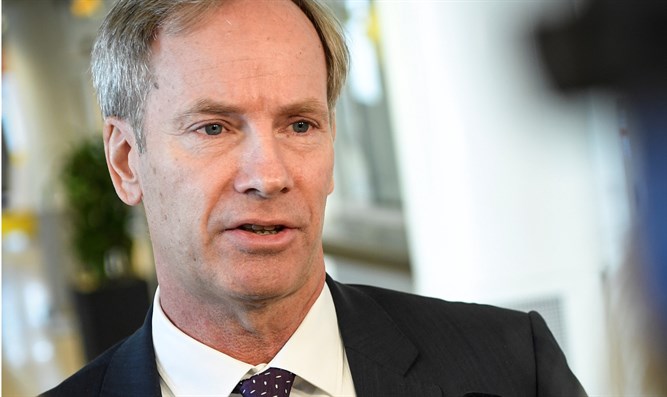EU delegation to UN head Olof Skoog seeks to solve Middle East conflict by video teleconference.
European Union Delegation to the United Nations head Olof Skoog issued a statement urging the United Nations Security Council to open a video teleconference on the “situation” in the Middle East.
Skoog wrote: “The European Union remains united in its commitment to achieving a two-state solution that meets Israeli and Palestinian security needs and Palestinian aspirations for statehood and sovereignty, ends the occupation that began in 1967, and resolves all permanent status issues in order to end the conflict.”
In furtherance of these visions, Skoog reiterated the European Union’s objective of basing their final solution on the relevant UN Security Council Resolutions, the Madrid principles including land for peace, the Roadmap, and agreements previously reached by the parties.
Skoog describes Israel and “an independent, democratic, contiguous, sovereign and viable State of Palestine, living side by side in peace and security and mutual recognition.” Skoog also included a sentence about the EU’s “fundamental commitment to the security of Israel, including with regard to current and emerging threats in the region.”
Hinting at whatever hopes may remain on the Israeli side about sovereignty in Judea and Samaria, the EU delegation head “strongly opposes all actions that undermine the viability of the two state solution and urges both sides to demonstrate, through policies and actions, a genuine commitment to a two-state solution in order to rebuild trust and create a path back to meaningful negotiations.”
The EU representative then announced their intention to “continue to closely monitor developments on the ground and their broader implications” and “consider further action in order to protect the viability of the two-state solution,” deploring without a hint of irony that it is “constantly eroded by new facts on the ground”.
Repeating the discredited claims that “settlements are illegal under international law, constitute an obstacle to peace and threaten to make a two state solution impossible,” and – without providing data to support his assertions – Skoog reiterated the EU’s “strong opposition to Israel’s settlement policy and actions taken in this context, such as building the separation barrier beyond the 1967 line, demolitions, and confiscation – including of EU funded projects – evictions, forced transfers including of Bedouins, illegal outposts and restrictions of movement and access.
The EU calls on Israel to halt continued settlement expansion, including East Jerusalem, especially in sensitive areas such as Har Homa, Givat Hamatos and E1, which severely threatens the two state solution.”
The “illegal outposts” that the EU seeks to protect may refer to Khan al Akmar, Likiya, or any number of EU-supported Palestinian land grab operations.
(Arutz 7).






